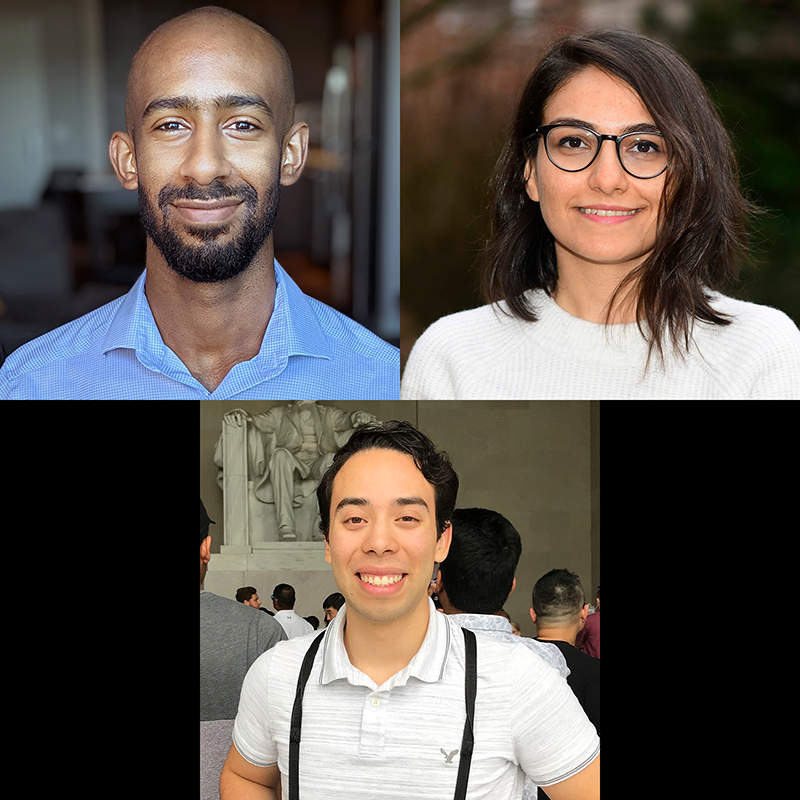ESTEFANY CARRILLO
Estefany Carillo received the B.S. and M.S. degrees in electrical engineering from the University of Maryland at College Park, College Park, MD, USA, in 2012 and 2017 respectively. She is currently pursuing the Ph.D. degree in aerospace engineering at the University of Maryland, College Park, College Park, MD, USA. She is currently a Research Assistant with the Department of Aerospace Engineering, UMD, under the supervision of Dr. Huan Xu. Her research focuses on the use of formal methods and hybrid systems theory in the design of verifiable controllers for complex high-level tasks and control of multiagent systems. She is a student member of IEEE.
PhD Research Topic: Inferring social norms via human trajectories using formal specification languages
In this research, we investigate methods for inferring social norms from human motion trajectories that exhibit compliance to a prescribed set of social norms commonly seen in indoor public spaces. Leveraging formal specification languages, such as Linear Temporal Logic (LTL), to explicitly express social norms, trajectories satisfying these social norms can be mined to determine the norm being satisfied. To infer socially compliant behavior, we frame the problem as determining the logical statement that best explains the observed behavior and as learning a reward function that captures the observed behavior through Inverse Reinforcement Learning. By tackling the problem from these two angles, we can work on identifying the advantages of each and identify opportunities for these two types of methods to work together. Using the inferred social norms, we can find all possible changes in human behavior that may result as a consequence of satisfying such norms with the goal of improving the prediction of human’s motion.
PhD Advisor: Huan ‘Mumu’ Xu
SARA HONARVAR
Sara Honarvar is a second-year PhD student in mechanical engineering at University of Maryland, College Park (UMD), working under supervision of Dr. Yancy Diaz-Mercado at the Collaborative Control and Robotics Laboratory (CCRL). She got her masters in Kinesiology at UMD in 2019. She graduated from Amirkabir University of Technology with a BS in biomedical engineering and minor in mechanical engineering. Sara’s research interests lie in modeling human-human interactions (HHI) through experimental and first-principle understanding of the underlying neuromechanical control mechanism behind these interactions. She is interested in utilizing these models to provide intuitive control strategies for robots interacting with humans.
PhD Research Topic: On modeling human-human interactions for safe human-robot interactions
Human motion prediction has been widely studied in different fields and is of interest in many applications such as in safe robotic navigation of congested areas for last-leg delivery. Even so, human motion trajectory prediction still provides challenges due to the complexity of human behavior, e.g., due to the large number of degrees of freedom, various internal (physiological) and external (environmental) constraints, and psychological aspects of decision-making. In our research, we utilize both theoretical and empirical analysis of human movement (both kinematics and kinetics) rooted in biomechanical and control-theoretic principles to construct models of the human skeletal and neuromechanical systems. We conjecture that, by combining a first-principle understanding of biomechanics, enriched with data-driven approaches from computer vision and machine learning algorithms, accurate human kinematic models can be developed, which could then be used by iterative motion planning algorithms to enable safe robotic navigation. By considering the biomechanical indicators of human performance, a dynamic characterization of movement can be furnished that considers skeletal kinematics, muscle routing kinematics, and force generating capacities. The biomechanical factors together with human cognitive maps can be utilized for identification of the human’s intentions for future states (e.g., expected flow into higher traffic areas or doors, social norms, pedestrian interactions).
PhD Advisor: Yancy Diaz-Mercado





